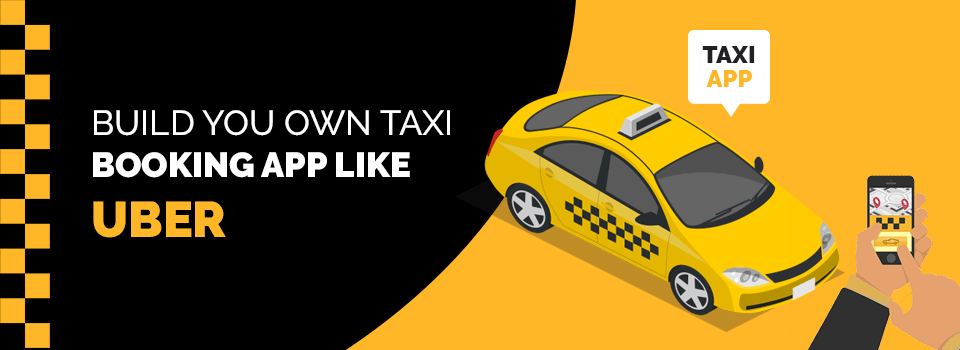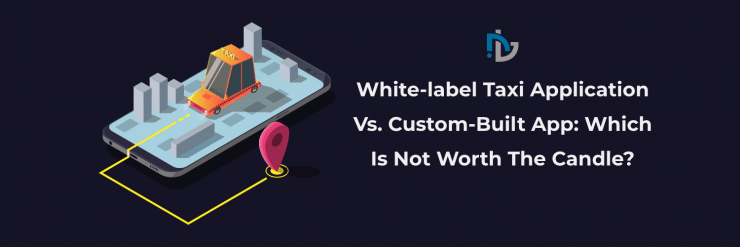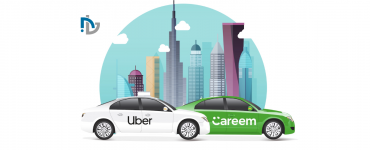Revenue in the ride-hailing industry is expected to show an annual growth rate of 13.7%, which amounts to $318<COMMA>765 million by 2023.
The limitless opportunities to earn big bundles have geared up the new entrants to jump on the taxi app industry bandwagon. In the rat race of establishing the successful taxi business at speed, the novice players looking for an easy and quick development-to-market solution that comes with a standard set of features and little customization facility.
The off-the-shelf product that’s ready to sell after rebranding is referred to as white-label apps. The white-label solutions alleviate the need to build the app from scratch and provide nearly the similar services that Uber-like taxi app offers.
The White-label Application- That’s Ideal to Deploy under Some Circumstances Can Be Built in Two Ways
The White-label Application- That’s Ideal to Deploy under Some Circumstances Can Be Built in Two Ways:
- While using the source code, no changes are made to the backend database and just a couple of modifications are done in the front-end design to add a look and feel of the taxi business to the app. Mostly, this inexpensive option is preferred by the entrepreneurs to get taxi services to reach the wider target audience swiftly.
- The multi-tenant application with the same app instances can be developed that run on the server and provide an app to each tenant (Customer) with little different features.
Want to prove the merit and mettle of the taxi business by creating an Uber-clone app through a white-label solution purchase? If so, let’s dig deeper.

The Set Of Features That White-label Taxi Apps Offer:
The white-label solution allows you to play a catch up with taxi giants without getting into the hassle of developing, designing, testing and deploying the application in a customized fashion. It allows you to penetrate the taxi market and raise a toast to success with three apps namely- driver app, passenger app, and taxi dispatch app. Each app with different interfaces offers basic functionalities. They are:
For passenger app:
- Pre-booking and post-booking of the rides
- Map integration
- Message chat integration
- Automated fare generation
- Credit/debit card payment support
- Feedback
For driver app:
- Booking request acceptance
- Map integration
- Message chat integration
- Automated payouts
For dispatch app:
- The web interface with VOIP integration
- Scale-up or scale down the number of fleets
- Front-end customization
- Analytics and reporting
- Data Archive
- Monitor vehicle and drivers in the real-time
It’s pretty fine. How can you get the taxi on the road with white-label taxi apps? The answer lies in the business model associated with white-label taxi apps:

A Quick Look At The Business Model:
- The white-label app can be rebranded to match the business identity, and then sold to the buyer at a fixed cost. Later, the buyer is responsible for the nitty-gritty related to the app. In some cases, support and maintenance services are also provided in the exchange of an annual fee.
- Going Saas way, the white-label app after rebranding is rented based on a monthly or annual subscription fees. Under the subscription model, the developers set up the app against fixed setup fees and Saas services are offered for the subscription fee, which varies according to the number of drivers registered. Onde, Taximobility, and Illuminati are some of the leading on-demand white-label taxi app service providers that offer various packages under the subscription model.
How Does The White-label Apps Work Like A Pro?
- Shorter release cycles
In the competitive marketplace, speed is a killer. When you want to nail a regional market with no mobile taxi solution availability through custom development, it eats up months in planning, development, designing, testing, and launching of the application. In the meantime, if the competitor gets built and launches the taxi application, they will acquire a large share of the audience and makes it difficult for you to penetrate the region. This is where white-label solution outshines as just in a week, you will get a full-fledged application and obtain a competitive advantage.
- Doesn’t cost a pretty penny
Building a custom taxi app solution is never less than 10,000 dollars. Either an in-house team will be hired or the taxi app development can be outsourced to get a personalized app matching taxi business needs, preferences, and reputation. Besides, the high investment requires you to get into the partnership with investors who will get a share of revenue that the taxi business will gain. It’s not a good deal. Isn’t it?
On the other hand, the white-label solution doesn’t put a deep hole in your pocket and with a little upfront investment, you will get the mobile application that can put the taxi on the road. Additionally, the easy customization options enable reflecting brand design and logo in the app.
- Zero maintenance hassle
When the application is developed employing an in-house team, then it brings support and maintenance needs on another hand. You need to choose a server, deploy it, frequently update the code and hire the system administrator to ensure everything runs smoothly as expected. Soon, it turns into an overhead.
The white-label mobile applications relieve from the app maintenance-related needs because it’s often deployed as Saas where the support and maintenance requirements of the application are handled by the seller’s team.

Why The Economical White-label Taxi Apps Are Not A Great Fit?
- Quality concerns
Purchasing a white-label solution is like buying an old car without a test drive. It means you remain unknown about how it works, the chances of errors, bugs, and crashes exist, and the code quality. The restricted access and limited information about backend inhibit the new admin to test the code quality and know about its robustness.
Even after opening your bank for the white-label solution provider, you have to bank on what they are saying about code quality. There is absolutely no control.
- Vendor lock-in
Getting an app for a subscription fee under Saas services doesn’t mean you have complete control over the application. The cloud facility certainly helps you to store user’s data on the cloud database, but it ends up your control over the data. Often, the taxi business requires permission to access their own user’s data and even, the access is disabled due to server downtime.
Although providers claim server uptime up to 99% in the agreement, the things hold less true when it comes to reality. Also, how can you be so assured of the server’s reliability without using them?
My two cents: Make sure the app allows you to access and export the user’s data. The vendor enables you to access the app even during server downtime.
- Little-to-no customization
The customization feature is enabled in the white-label apps, but it’s limited to labeling, logo, and coloring that don’t represent the brand to its entirety in the app. Introducing complex business logic demands a breadth of customization options, which is not feasible with white-label products. In the event, you want to mirror the brand in the app everywhere then, building the custom app from scratch is a good decision.
- Lacks Scalability
Boundless growth is your desire for the taxi business but you cannot define a figure for success or growth. Right? How about if the app crashes when the number of drivers and passengers increase by manifolds? This is the case with a white-label product where the provider assures you about architecture (Which remains hidden) that can handle the growing number of users, but you cannot count on the words.
On the flip side, you can stay assured of the custom app, that’s built from scratch as you are pretty aware of all the development aspects like- how the increasing number of requests can impact server, what changes required in the architecture to ensure glitch-free performance and others.
- App store rejection
Do you remember the thousands of apps that were deleted from the app store as a part of cleaning the app store from cloning and spamming apps? Yes, it has become a part of app store guidelines that were updated in 2017. It means with a white-label solution (Fewer customization), you risk launching an app that looks like other apps on the app store, which can be rejected anytime soon and will put the business reputation and credibility at stake.

In the same vein, do you want to know what Nectarbits thinks about the white-label solution model? Want to know- are we into the process of engineering and selling white-label taxi apps? Many of the clients are asking about the same.
We have added this section to unearth the reality that’s real. The pros and cons of white-label solutions have made it clear that the off-the-shelf products are attractive due to lower investment of time, dollars, and effort, but it’s not a feasible solution for the long run as the business grows. This is why we say NO to building and offering white-label products to the clients and prefer custom app development that fills the void.
Read more : The Effects of Mobile Apps in Our Lives
Nectarbits is a Software Development Company where the coding superheroes and design engineers build customized solutions from scratch that meet the client, customer, and market expectations.
Again, the white-label taxi solution fits in some context and remains the preference for some of the taxi businesses. Plus, with hundreds of white-label service providers, finding the right partner and checking the trustworthiness is imperative. We have got your needs covered in the next section.
Different ways to ensure the reliability and credibility of the software service provider:
Before moving ahead and moving into a partnership, it’s all-important to ask some questions and clear up a couple of things to avoid conflicts at the end, which negatively impact your business. Here’s the list of questions that you must consider:
- Ask about data import and export facilities to and from the server.
- Ask about the data backups and their frequency.
- Ask about the disaster recovery support in the case of hardware failure.
- Ask about the performance testing and the intervals at which it’s executed.
- Ask about the security and compliance adherence related to the taxi industry, and whether they meet or not.
- Ask about the app update and what’s included in the update package.
Conclusion
Under the hood, the white-label taxi app provides everything under a single package, which can even become a dollar-generating machine. However, the lucrative opportunity turns into a nightmare when your business starts reaching new heights and suddenly, the app crashes. It’s saddening.
The taxi business that’s hitting the headlines of newspapers due to the enormous success it earned in a shorter span will face the customer’s rage. This is why the comparatively expensive custom app development is far better than the short-lived success, which proves to be quite costly at a later stage.
What’s your take? Which option do you find the best? Let us know your reactions in the comments below.









